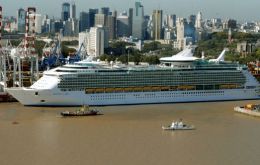MercoPress. South Atlantic News Agency
Argentina
-
Wednesday, October 6th 2010 - 05:20 UTC
Chile freezes relation and calls off series of meetings with Argentina

Chilean Argentine relations deteriorated seriously on Tuesday when the government of President Sebastian Piñera announced they were calling off a series of meetings at Foreign Affairs ministerial level following on Buenos Aires decision to grant political asylum to a former guerrilla fighter.
-
Tuesday, October 5th 2010 - 03:03 UTC
Rift widens as Chile hands letter of complaint to Argentine ambassador

The differences between Chile and Argentina with regards to the ex guerrilla fighter Sergio Galvarino Apablaza Guerra's situation were clearly marked during the meeting between Chile's Foreign Minister, Alfredo Moreno, and Argentine Ambassador to Chile Ginés Gonzáles García.
-
Tuesday, October 5th 2010 - 00:11 UTC
Buenos Aires brand new exclusive terminal expects 140 cruise calls this season

An estimated 140 cruise vessels will be calling in Buenos Aires this coming 2010/2011 season and on arrival visitors will be greeted at a refurbished terminal which should be ready for inauguration in December.
-
Monday, October 4th 2010 - 00:41 UTC
Chile/Argentina bilateral relations sailing into rough waters

The Argentine/Chilean bilateral relationship could be sailing into rough waters following reports in the Chilean press about the terms used by Buenos Aires to justify the non extradition of a former guerrilla Galvarino Apablaza Guerra accused of killing a Chilean senator in democracy.
-
Friday, October 1st 2010 - 02:14 UTC
Post-82 Falklands generations ever more distant from Argentina

The “belligerent” policy of Argentina towards the Falklands/Malvinas Islands has only harvested the antipathy of the young generations of the Islands born since the 1982 conflict said elected Member of the Legislative Assembly Roger Edwards
-
Friday, October 1st 2010 - 01:58 UTC
JBS meat group regrets investing in Argentina because of lack of sufficient cattle

JBS the world’s leading meat producer and distributor said it “temporarily” regrets having invested in Argentina since the lack of sufficient prepared cattle has forced the closure of several plants and the redundancy of 480 workers.
-
Friday, October 1st 2010 - 00:14 UTC
Uruguay presented pre-candidacy, with Argentina, for the 2030 World Cup

The international football federation, FIFA, President Joseph Blatter confirmed that Uruguay has expressed interest in organizing jointly with Argentina, the 2030 World Soccer Cup, to celebrate the 100 years of the first Jules Rimet edition and Uruguay’s victory.
-
Wednesday, September 29th 2010 - 01:14 UTC
Argentina gold production up 21% this year estimated to reach 2.05 million ounces

Argentina’s gold production will rise by about 21% in 2010 from a year earlier, Mining Secretary Jorge Mayoral announced in Buenos Aires.
-
Tuesday, September 28th 2010 - 21:45 UTC
Chinese jiggers allowed into Argentine ports as of next December

As of next December Chinese flagged jigger vessels can enter Argentine ports, make use of services, unload shipments, carry out repairs and stock up on supplies. The Federal Fisheries Council, CFP will be responsible for determining which port terminals will be entitled to cater Chinese jiggers.
-
Monday, September 27th 2010 - 15:31 UTC
Argentina retains a “competitive peso” in spite of global inflows of US dollars

Contrary to what is happening in the rest of emerging markets Argentine government efforts to weaken the peso are working. In the past three months the peso has declined 0.8% against the dollar, while for Mercosur associates Brazil and Uruguay their currencies have strengthened in the range of 3 to 5%.
